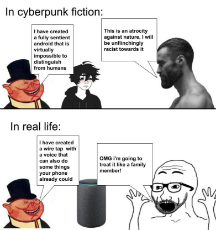>few years ago, generative AI and LLMs are first entering the public zeitgeist.
>countless opportunities and excitement arises in terms of video games
>imagine NPC's you can fully interact with, not just using predefined conversation paths
>imagine photorealistic, movie like graphics being generated on the fly where you cannot tell virtual and real life footage apart
>Imagine in-depth stories generated uniquely to you by AI game master like entities.
>fast forward to now
>everyone thinks AI is slop
>usage of AI is seen as cheap and lazy
>""artists"" are going crazy because machines are suddenly becoming just as capable, if not better at creating original content
>usage of LLMs is seen as some cardinal sin in the realm of creativity.
>generative AI companies are slandered from training their content on other works and "stealing" from artists - despite the fact every story, drawing, song is in some way inspired by previous works.
Is it fear of progress? Inability to cope with the fact that certain skills, like illustration, once seen as somewhat valuable are not actually that special and can be replicated so easily by machines?
/cyb/ - Cyberpunk Fiction and Fact
Cyberpunk is the idea that technology will condemn us to a future of totalitarian nightmares here you can discuss recent events and how technology has been used to facilitate greater control by the elites, or works of fiction
Anonymous
No.3726
I think part of it is that the establishment is pissed people like the AI art more than the modern art money laundering scheme.
>The online message board 4chan is being investigated by the UK communications regulator over failure to comply with recently introduced online safety rules.
>Ofcom says it has received complaints over potential illegal content on the website, which has not responded to its requests for information.
>Under the Online Safety Act, online services must assess the risk of UK users encountering illegal content and activity on their platforms, and take steps to protect them from it.
>Ofcom is also investigating porn provider First Time Videos over its age verification checks, and seven file sharing services over potential child sexual abuse material.
>4chan has been contacted for comment.
>Ofcom says it requested 4chan's risk assessment in April but has not had any response.
>The regulator will now investigate whether the platform "has failed, or is failing, to comply with its duties to protect its users from illegal content".
>It would not say what kind of illegal content it is investigating.
>Ofcom has the power to fine companies up to 10% of their global revenues, or £18m - whichever is the greater number.
>4chan has often been at the heart of online controversies in its 22 years, including misogynistic campaigns and conspiracy theories.
>Users are anonymous, which can often lead to extreme content being posted.
>It was the subject of an alleged hack earlier this year, which took parts of the website down for over a week.
The gilded cage for UK internet users is about to get much, much smaller.
https://web.archive.org/web/20250128165536/https://www.gov.uk/government/publications/online-safety-act-explainer/online-safety-act-explainer
[Read more] >Ofcom says it has received complaints over potential illegal content on the website, which has not responded to its requests for information.
>Under the Online Safety Act, online services must assess the risk of UK users encountering illegal content and activity on their platforms, and take steps to protect them from it.
>Ofcom is also investigating porn provider First Time Videos over its age verification checks, and seven file sharing services over potential child sexual abuse material.
>4chan has been contacted for comment.
>Ofcom says it requested 4chan's risk assessment in April but has not had any response.
>The regulator will now investigate whether the platform "has failed, or is failing, to comply with its duties to protect its users from illegal content".
>It would not say what kind of illegal content it is investigating.
>Ofcom has the power to fine companies up to 10% of their global revenues, or £18m - whichever is the greater number.
>4chan has often been at the heart of online controversies in its 22 years, including misogynistic campaigns and conspiracy theories.
>Users are anonymous, which can often lead to extreme content being posted.
>It was the subject of an alleged hack earlier this year, which took parts of the website down for over a week.
The gilded cage for UK internet users is about to get much, much smaller.
https://web.archive.org/web/20250128165536/https://www.gov.uk/government/publications/online-safety-act-explainer/online-safety-act-explainer
9 replies and 4 files omitted.
>>3718
It only seems overrated because we have since learned that people are so much worse than the characters depicted in the book. When Orwell wrote it in 1949 it was positively shocking.
It only seems overrated because we have since learned that people are so much worse than the characters depicted in the book. When Orwell wrote it in 1949 it was positively shocking.
Anonymous
No.3720
>>3718
>At the same time I'm a little impressed at how effectively modern Britain has managed to emulate it
The normies are going to norm. Every Single Time.
>At the same time I'm a little impressed at how effectively modern Britain has managed to emulate it
The normies are going to norm. Every Single Time.
Anonymous
No.3721
>>3719
The Overton Window has been moved underground, to a locked filing cabinet in a disused lavatory.
The Overton Window has been moved underground, to a locked filing cabinet in a disused lavatory.
Further bullshit
>Pornhub and a number of other major adult websites have confirmed they will introduce enhanced age checks for users from next month.
>Parent company Aylo says it is bringing in "government approved age assurance methods" but has not yet revealed how it will require users to prove they are over 18.
>Regulator Ofcom has previously said simply clicking a button, which is all the adult site currently requires, is not enough.
>Ofcom said the changes would "bring pornography into line with how we treat adult services in the real world."
>The Online Safety Act requires adult sites to introduce "robust" age checking techniques by this summer.
>Approved measures include demanding photo ID or running credit card checks before users can view sexually explicit material.
>"Society has long protected youngsters from products that aren't suitable for them, from alcohol to smoking or gambling," said Oliver Griffiths, Ofcom's group director of online safety, in a statement.
>"For too long children have been only a click away from harmful pornography online."
>Mr Griffiths said assurances from Aylo and several other porn providers, including Stripchat and Streamate, regarding the introduction of new age checks showed "change is happening".
>The regulator said its recent research indicated 8% of children aged 8-14 in the UK had visited an online porn site or app over a 28-day period.
>This included about 3% of eight to nine year olds, its survey suggests.
>"We know that highly effective age assurance can play a vital role in protecting young users from accessing harmful and inappropriate material on social media and other platforms," said Rani Govender, policy manager for child safety online at the NSPCC.
>"It is time tech companies take responsibility for ensuring children have safe, age-appropriate experiences online, and we welcome the progress that Ofcom are making in this space."
...
>Under the Online Safety Act, providers of platforms where children could encounter porn and harmful content must have measures in place to stop them accessing it.
>The Act requires this to take place chiefly through the use of technology that is "highly effective" in determining whether a user is 18.
>Ofcom said in January, external this could include solutions such as photo ID matching, digital identity services or facial age estimation.
>Porn providers that fail to meet the Act's requirements could face enforcement action such as huge fines.
https://web.archive.org/web/20250626114338/https://www.bbc.com/news/articles/cr5v2lz5vl6o
[Read more] >Pornhub and a number of other major adult websites have confirmed they will introduce enhanced age checks for users from next month.
>Parent company Aylo says it is bringing in "government approved age assurance methods" but has not yet revealed how it will require users to prove they are over 18.
>Regulator Ofcom has previously said simply clicking a button, which is all the adult site currently requires, is not enough.
>Ofcom said the changes would "bring pornography into line with how we treat adult services in the real world."
>The Online Safety Act requires adult sites to introduce "robust" age checking techniques by this summer.
>Approved measures include demanding photo ID or running credit card checks before users can view sexually explicit material.
>"Society has long protected youngsters from products that aren't suitable for them, from alcohol to smoking or gambling," said Oliver Griffiths, Ofcom's group director of online safety, in a statement.
>"For too long children have been only a click away from harmful pornography online."
>Mr Griffiths said assurances from Aylo and several other porn providers, including Stripchat and Streamate, regarding the introduction of new age checks showed "change is happening".
>The regulator said its recent research indicated 8% of children aged 8-14 in the UK had visited an online porn site or app over a 28-day period.
>This included about 3% of eight to nine year olds, its survey suggests.
>"We know that highly effective age assurance can play a vital role in protecting young users from accessing harmful and inappropriate material on social media and other platforms," said Rani Govender, policy manager for child safety online at the NSPCC.
>"It is time tech companies take responsibility for ensuring children have safe, age-appropriate experiences online, and we welcome the progress that Ofcom are making in this space."
...
>Under the Online Safety Act, providers of platforms where children could encounter porn and harmful content must have measures in place to stop them accessing it.
>The Act requires this to take place chiefly through the use of technology that is "highly effective" in determining whether a user is 18.
>Ofcom said in January, external this could include solutions such as photo ID matching, digital identity services or facial age estimation.
>Porn providers that fail to meet the Act's requirements could face enforcement action such as huge fines.
https://web.archive.org/web/20250626114338/https://www.bbc.com/news/articles/cr5v2lz5vl6o
26 replies and 12 files omitted.
Anonymous
No.3703
>>3702
I don't know off the top of my head but I'm pretty sure there's plenty. Fundamentally proof of work is nothing more than "calculate this difficult function whose output cannot be predicted so is effectively random, then we use a scoring system to determine when the output wins the lottery and is valid to produce a block". QC makes SHA hashes easy to predict thus invalidating Bitcoin's proof of work (since you can bypass the lottery), but all you need is to swap out the hash for something else that's quantum resistant. Look up quantum resistant hash algorithms or something.
I don't know off the top of my head but I'm pretty sure there's plenty. Fundamentally proof of work is nothing more than "calculate this difficult function whose output cannot be predicted so is effectively random, then we use a scoring system to determine when the output wins the lottery and is valid to produce a block". QC makes SHA hashes easy to predict thus invalidating Bitcoin's proof of work (since you can bypass the lottery), but all you need is to swap out the hash for something else that's quantum resistant. Look up quantum resistant hash algorithms or something.
>crypto
Lmao
That said I've got a fair portfolio out of investing in Chinese startups and companies. Pay attention to Gacha games, they're the modern casino.
Lmao
That said I've got a fair portfolio out of investing in Chinese startups and companies. Pay attention to Gacha games, they're the modern casino.
Anonymous
No.3705
Biocomputers (https://en.m.wikipedia.org/wiki/Biological_computing) are an emergency technology where biological components are made to store and/or process information for computers. Biocomputers have been made in the past using brain cells (https://www.newscientist.com/article/dn6573-brain-cells-in-a-dish-fly-fighter-plane/) however keeping brain cells alive is both difficult and expensive. Other approaches are currently being tried using fungi and bacteria. (https://www.technologyreview.com/2021/11/09/1039107/e-coli-maze-solving-biocomputer/ https://www.cnet.com/science/pianist-to-perform-musical-duet-with-slime-mold/). There are also approaches in synthetic biology that would use individual biological molecules for computing. (https://en.m.wikipedia.org/wiki/DNA_computing https://en.m.wikipedia.org/wiki/Peptide_computing https://en.m.wikipedia.org/wiki/Transcriptor)
So my question to you /cyb/ is how will these devices change the world of computing?
So my question to you /cyb/ is how will these devices change the world of computing?
55 replies and 7 files omitted.
>>2548
>“Next steps will be to improve the programmability of our biocomputer, so that we can solve multiple problems on one device,” added Zorlutuna.
What a shameless grifter and con man.
>“Next steps will be to improve the programmability of our biocomputer, so that we can solve multiple problems on one device,” added Zorlutuna.
What a shameless grifter and con man.
>>2551
An electro-chemical reaction is not a computer and tweaking that reaction is not the software.
That cretin is using the 'computer' label while calling his contact in the judenpresse to facilitate more shekels and a steady incoming.
An electro-chemical reaction is not a computer and tweaking that reaction is not the software.
That cretin is using the 'computer' label while calling his contact in the judenpresse to facilitate more shekels and a steady incoming.
Anonymous
No.2554
>>2553
>it is a form of computing
A forced analogy (a form of computing you said) doesn't turn one into another.
>it is a form of computing
A forced analogy (a form of computing you said) doesn't turn one into another.
Anonymous
No.3697
Biocomputing is really starting to take off.
[YouTube] Here’s How Biocomputing Works And Matters For AI | Bloomberg Primer![]()
https://www.microsoft.com/en-us/research/project/dna-storage/
Fun fact in the original script of the matrix the humans were used as processors not batteries, but the studio thought that audiences wouldn't get it.
[YouTube] Here’s How Biocomputing Works And Matters For AI | Bloomberg Primer
https://www.microsoft.com/en-us/research/project/dna-storage/
Fun fact in the original script of the matrix the humans were used as processors not batteries, but the studio thought that audiences wouldn't get it.
AI is now generating medicine. Everything from novel antibiotics, to diagnostics, to vaccines, to personalized cancer treatments. AI generated medicine is a field that is growing very fast.
https://cepi.net/ai-enhanced-self-amplifying-mrna-vaccine-set-combat-one-deadliest-known-viruses
https://www.wptv.com/news/technology/stargate-ai-project-could-help-create-cancer-mrna-vaccine-oracle-ceo-larry-ellison-says
https://news.tulane.edu/pr/tulane-researchers-use-ai-improve-diagnosis-drug-resistant-infections
https://macleans.ca/society/health/stoked-bio-antibiotics/
https://healthimaging.com/topics/artificial-intelligence/ai-ups-breast-cancer-detection-post-mastectomy
https://cepi.net/ai-enhanced-self-amplifying-mrna-vaccine-set-combat-one-deadliest-known-viruses
https://www.wptv.com/news/technology/stargate-ai-project-could-help-create-cancer-mrna-vaccine-oracle-ceo-larry-ellison-says
https://news.tulane.edu/pr/tulane-researchers-use-ai-improve-diagnosis-drug-resistant-infections
https://macleans.ca/society/health/stoked-bio-antibiotics/
https://healthimaging.com/topics/artificial-intelligence/ai-ups-breast-cancer-detection-post-mastectomy
36 replies and 7 files omitted.
Anonymous
No.3687
>>3686
The ABC report is featuring a guy who took chemo then Fenbendazole right? There are papers on using parasite medications as adjunct to chemo https://pmc.ncbi.nlm.nih.gov/articles/PMC7404055/ both the chemo and the parasite drugs work together in these cases. I don't know why you would choose that over something personalized.
The ABC report is featuring a guy who took chemo then Fenbendazole right? There are papers on using parasite medications as adjunct to chemo https://pmc.ncbi.nlm.nih.gov/articles/PMC7404055/ both the chemo and the parasite drugs work together in these cases. I don't know why you would choose that over something personalized.
https://www.frontiersin.org/journals/immunology/articles/10.3389/fimmu.2025.1609162/abstract
Peptide based cancer vaccines are also starting to look promising. Not sure if they will be better than mRNA as mRNA can be used to produce antibodies in vivo.
Peptide based cancer vaccines are also starting to look promising. Not sure if they will be better than mRNA as mRNA can be used to produce antibodies in vivo.
Anonymous
No.3695
>>3694
That's true of everything that I posted. I don't think any cancer treatments were allowed without tests. Even the covid vaxx required SOME testing although it was rushed many of the candidates did not make the cut. Still it should never have been forced on people.
That's true of everything that I posted. I don't think any cancer treatments were allowed without tests. Even the covid vaxx required SOME testing although it was rushed many of the candidates did not make the cut. Still it should never have been forced on people.
Anonymous
No.3696
https://www.caltech.edu/about/news/3d-printing-in-vivo-using-sound
A new 3d printing technique using ultrasound made at caltech. Should be interesting to see where this goes. Could potentially be done in vivo.
A new 3d printing technique using ultrasound made at caltech. Should be interesting to see where this goes. Could potentially be done in vivo.
Room-temperature superconductors are actually a dangerous technology, and here's why: centralization. Simply put, when the power plant doesn't have to be near the users of said power, whoever can sell power the cheapest will amass customers globally instead of locally. With time, the vast majority of electricity generation will be monopolized by one entity located somewhere like China with lax anti-pollution laws. Thoughts?
Anonymous
No.3689
>>3688
Counter point. Joule-thief and or something warm.
Room temp superconductors means the average joe can somehow salvage it and use it for other things.
Put simply they keep on fucking up on having a decent grid and will continue to have an awful grid because that's their back door to shutting down nations.
But putting room temp super conductors into the hands of people, there's some interesting things that can be done.
The short answer is easy to set up ye olde internets connecting people on totally seperate systems and hardware and power.
Moving electrons with minumal resistance allows for some crazy edge cases.
Counter point. Joule-thief and or something warm.
Room temp superconductors means the average joe can somehow salvage it and use it for other things.
Put simply they keep on fucking up on having a decent grid and will continue to have an awful grid because that's their back door to shutting down nations.
But putting room temp super conductors into the hands of people, there's some interesting things that can be done.
The short answer is easy to set up ye olde internets connecting people on totally seperate systems and hardware and power.
Moving electrons with minumal resistance allows for some crazy edge cases.
Anonymous
No.3690
>>3688
Fun fact, even if copper is better electrical conductor, aluminum is used instead for long distances high voltage lines.
On the same token, superconductor materials are laboratory frankesteins not suitable for mass industrial applications, be by price, be by availability.
Fun fact, even if copper is better electrical conductor, aluminum is used instead for long distances high voltage lines.
On the same token, superconductor materials are laboratory frankesteins not suitable for mass industrial applications, be by price, be by availability.
Anonymous
No.3692
I actually think this is a good thing overall. But in my opinion, instead of increasing centralization, superconductors could decentralize power production.
The thing is, fossil fuels don't have a long future ahead, sooner or later we'll fully shift to renewable sources like solar, wind, and hydro.
The problem with these has always been that the best spots to generate that energy are often far from cities or industrial centers. But with superconductors, we could finally take full advantage of all those remote locations and move electricity across long distances with basically no loss.
That means even some underdeveloped countries like in Africa, could become ideal places to generate and export electricity.
Plus, with better solar materials becoming cheaper and more efficient, every household could become a small independent power producer. And with superconductors, it's not just local, a single home could sell electricity back to the grid, or even to companies or governments far away. That could be huge economically.
As for cost, yeah, copper and aluminum don't differ much in resistance to make it worth switching. But even if we only use superconductors for the power generation side, the efficiency and profit increase would still be massive.
And don't forget, we keep discovering and inventing new superconducting materials all the time. So I wouldn’t count this tech out. It could very well become practical and affordable at scale.
[Read more] The thing is, fossil fuels don't have a long future ahead, sooner or later we'll fully shift to renewable sources like solar, wind, and hydro.
The problem with these has always been that the best spots to generate that energy are often far from cities or industrial centers. But with superconductors, we could finally take full advantage of all those remote locations and move electricity across long distances with basically no loss.
That means even some underdeveloped countries like in Africa, could become ideal places to generate and export electricity.
Plus, with better solar materials becoming cheaper and more efficient, every household could become a small independent power producer. And with superconductors, it's not just local, a single home could sell electricity back to the grid, or even to companies or governments far away. That could be huge economically.
As for cost, yeah, copper and aluminum don't differ much in resistance to make it worth switching. But even if we only use superconductors for the power generation side, the efficiency and profit increase would still be massive.
And don't forget, we keep discovering and inventing new superconducting materials all the time. So I wouldn’t count this tech out. It could very well become practical and affordable at scale.
80 replies and 74 files omitted.
>>3399
>antiX
>X11
antiX is a Linux distribution. X11 is a graphic server for displaying windows on a desktop.
>antiX
>X11
antiX is a Linux distribution. X11 is a graphic server for displaying windows on a desktop.
Anonymous
No.3626
Anonymous
No.3629
>>3625
My understanding had been antiX was the name of a window manager.
...it's, ...less ironic once you compare features and normal usage with "other" window managers, let alone desktop managers.
My understanding had been antiX was the name of a window manager.
...it's, ...less ironic once you compare features and normal usage with "other" window managers, let alone desktop managers.
for my high school graduation project I created a BLFS OS which I named DashOS after Rainbow Dash. it's really shitty as it has no GUI and is built for my own educational purposes, but I hope one it I could use it and make it live up to the name of my fav mare
(btw among friends we call it SmegmaOS)
(btw among friends we call it SmegmaOS)
41 replies and 37 files omitted.
1746831077.png (568.0 KB, 3725x4822, 2025.05.07-12.26.01-SNAGIT-0038.png)

>no support contract?
>UNINSTALL ALL THE PATCHES YOU PAID FOR!
Absolutely jewish behavior.
>UNINSTALL ALL THE PATCHES YOU PAID FOR!
Absolutely jewish behavior.
For the truly cyberpunk gun experience. Post your own paywalled or loginwalled firearm files, suppressor designs, ECM templates, etc. Feds begone.
Stingray (includes all part files, detailed assembly instructions, shopping list for all materials and where you can get them, electrochemical machining tutorial for the barrel rifling, etc. I also added a video tutorial for ECM machining if you prefer that): (Password: Fuck14Google88FuckKikes!$FuckNiggers**KillFaggots**) https://drive.google.com/file/d/1OY0_Y49z81VtZihQ_v4i_yI1kSrClhAF/view?usp=sharing
Defcad archive: I have a rather large (20.8GB) archive of old defcad files that I got from the internet archive at some point, and can no longer find. I haven't found a site that supports hosting of files of that size, however if anybody wants it I can send it to you via croc, just ask: https://github.com/schollz/croc
Please let me know if there are any issues with the files or if google takes them down, if I get the chance to print any of these IRL I will share results too, hope you all enjoy :)
Stingray (includes all part files, detailed assembly instructions, shopping list for all materials and where you can get them, electrochemical machining tutorial for the barrel rifling, etc. I also added a video tutorial for ECM machining if you prefer that): (Password: Fuck14Google88FuckKikes!$FuckNiggers**KillFaggots**) https://drive.google.com/file/d/1OY0_Y49z81VtZihQ_v4i_yI1kSrClhAF/view?usp=sharing
Defcad archive: I have a rather large (20.8GB) archive of old defcad files that I got from the internet archive at some point, and can no longer find. I haven't found a site that supports hosting of files of that size, however if anybody wants it I can send it to you via croc, just ask: https://github.com/schollz/croc
Please let me know if there are any issues with the files or if google takes them down, if I get the chance to print any of these IRL I will share results too, hope you all enjoy :)
26 replies and 7 files omitted.
>>2765
>Should we just let fear rule us and be intimidated into silence when nothing we're discussing is illegal?
That is literally, exactly, what they want.
If they can rule you with fear they don't need to rule you with anything else.
>Should we just let fear rule us and be intimidated into silence when nothing we're discussing is illegal?
That is literally, exactly, what they want.
If they can rule you with fear they don't need to rule you with anything else.
1745525320.png (68.8 KB, 640x480, E2B8B0245A05B3731420C95C111D285F-70488.png)

Anonymous
No.3619
>>3633
Ever see/have any successes with the sig P320 pistol? I know they make firearm blanks, and I've seen the grip files but not the magazine, which are steel if you get OEM ... and $60/ea, and not shippable to the 1/3rd of our great nation (c) that doesn't _like_ more-than-ten-rounds of freedom.
So I'm hesitant to get started on what fascinates me most, a M17 in 357-SIG
Ever see/have any successes with the sig P320 pistol? I know they make firearm blanks, and I've seen the grip files but not the magazine, which are steel if you get OEM ... and $60/ea, and not shippable to the 1/3rd of our great nation (c) that doesn't _like_ more-than-ten-rounds of freedom.
So I'm hesitant to get started on what fascinates me most, a M17 in 357-SIG
This thread is all about robo horse waifus. What would be the major technological challenges? How close is current technology? What would you want in your robowaifu?
biopone discussion goes here >>236 →
biopone discussion goes here >>236 →
79 replies and 34 files omitted.
1713235276.webm (1.2 MB, Resolution:444x960 Length:00:00:30, 1713227188565388.webm) [play once] [loop]

Previous [1][2][3][4][5][6][7][8][9][10] Next






























 Ex: Type :littlepip: to add Littlepip
Ex: Type :littlepip: to add Littlepip  Ex: Type :eqg-rarity: to add EqG Rarity
Ex: Type :eqg-rarity: to add EqG Rarity 